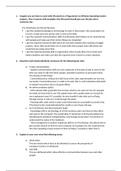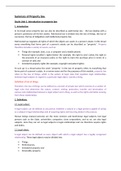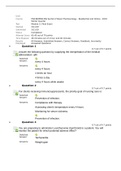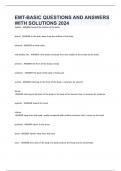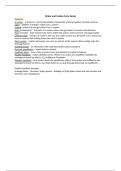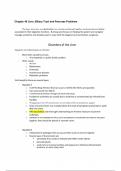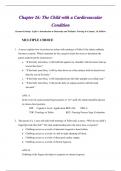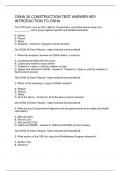Emergence of Authoritarian States
Conditions in which the authoritarian state emerged (Economic-Social Division-Impact of War-
Weakness of Political System)
Conditions
Economic Factors:
o In the 19th Century, Cuba’s economy entirely depended on the exportation of slave
produced goods and trade with the U.S
o U.S companies owned many Cuban plantations
o 75% of rural housing were palm huts without running water. And an illiteracy rate
of 41%
o Great depression dropped the worth of sugar. Before it was worth 200 Million$
after 3 years it was worth 40 million $.
o Increased inflation 40% per year since 1959
Social Division:
o Geographical divide created a social division in class and ethnicity
o Areas closer to ocean currents were modernize. Ex: Cuba’s main trading points were
located in the west
o Income inequality created greater gap in social class especially Shacklands.
o Most Cubans in the East were ex-slaves or black. Ex: Oriente (in the far east) was the
poorest and witnessed the most slave-revolts.
o Most Cubans in the west were of Spanish decent and lighter skin color, they were socially
and economically satisfied.
o By 1886 Spain abolished slavery in Cuba however this left the ex-slaves and their
descendants in poor conditions and politically powerless.
Weakness of Political Systems:
o Elections were rigged and geared towards pleasing the U.S’ economic objectives
o In 1901 the U.S passes Platt Amendment to intervene in Cuba militarily.
o Due to corrupt dictatorship of president Gerardo Machado and wall street crash, student
protests (Sergeants Revolt) led by Fulgencio Batista in 1933-1934 took place.
o From 1934-1959 Batista ruled directly through puppet president
o Machado is forced to resign by the U.S and Cuba now is governed by Ramon Grau in a
“Provisional Government”. At this point most of the power was in colonel Fulgencio
Batista because he had the army at his fingertips.
o Strikes and protests rose against Grau’s presidency resulting in police and army brutality
against civilians. Grau dealt with this by bribing armed gangs with important positions. As a
result, corruption within the government rose, giving Fulgencio Batista a reason to become
president in 1940.
o In 1940-1944 Fulgencio Batista, first mixed president, gains support from most of Cuba’s
non-white society by bribing journalists and clergy men.
In his first presidency upper class/economically powerful people remained
powerful.
He was pro-American and pro-capitalism which reduced support from
communist parties.
In WW2 Cuban export of sugar increased, most of the profit went to foreign
corporations.
Batista stepped down because he lost the 1944 elections to Grau
, o In 1944 Grau was elected however the constant political corruption, violence, bribery,
and intimidation continued to exist. He did not create any socio-economic reforms and
continued to support the wealthy.
Ex: Grau awarded gangs by appointing them as chief of police department. In
return Grau received a secret army to use against Grau’s opponents.
o March 1952 Batista leads a 2nd Military Coup against Grau
Impact of War:
o Before 1902 Cuba was a Spanish colony. Nationalist Cubans fought 3 wars of
independence from 1868-78 and 1895-98. Then another 4 years of U.S influence due to Platt
Amendment of 1901.
o The third war, led by Jose Marti, a national hero to the Cuban people who inspired many
Cubans to continue fighting for full independence.
o In April 1898, the U.S agreed to help Cubans gain independence from Spain. By
December 1898 Cuba becomes independent from Spain!!! However, U.S remains in Cuba.
o Cuba gains official independence in 1902
Why is the U.S Interested in Cuba? How did the U.S help Cuba gain nationalism?
In 1895, U.S invested lots of money in Cuba. If Cuban Nationalists rose, the U.S would lose
profit and interests.
The U.S supported the Cuban Military, they also used anti-Spanish propaganda to move the
attention away from U.S troops residing in Cuba.
The U.S also purposely blew up their own boat and blamed it on Spain (would give them an
incentive to stay in Cuba)
Methods: used to establish authoritarian states: (Persuasion-Role of Leaders-Ideology-The use of
Force-The use of Propaganda) How was Castro successful?
Use of Force:
o Organizes the Moncada Barracks attack in 26/July/1953
Planned to attack the capital of impoverished province and use the military’s
supplies to gain greater power. However, failed because Batista’s officers captured,
killed, and tortured dozens of the 160 attackers.
October 1953 Castro goes to trial and gives the famous “History will absolve
me” speech. This gave Castro the chance to outline his ideas for a new Cuba. To
create a fairer society and eliminate corruption in Cuban politics.
Castro sent to 15 years in prison. Released in May 1955 but was exiled to
Mexico.
o Granma Expedition (Santiago Uprising) November 1956
82 revolutionaries planned to cross seas to Cuba and join forces with Frank Pais .
Failed due to rough waters. On the other hand, greater support from peasants and
some of Batista’s officers.
o Sierra Maestra Campaign 1956-1959
Guerilla group survivors regrouped and planned a hit-and-run campaign against
Batista’s force.
It was largely successful due to the cooperation of Che Guevara, Vilma Espin,
Celia Sanchez, Frank Pais. However, it was not successful.
o Operation Verano June 1958
Batista launches this operation w 12,000 government troops, air force,
navy, tanks etc. However, was at a disadvantage since his soldiers didn’t know
the landscape.
, Castro’s forces cut off 1,500 army reinforcements which he used to start
negotiating with Batista
Castro launches a counter-attack and entered Havana on January 2nd 1959.
Persuasion:
o Castro’s Morale leadership and positivity gained him more supporters.
o The M/26/7 movement was taking place in most of Cuba’s rural areas where peasants and
working class lived.
o The rebel’s (Fidelistas) policy of treating peasants with respect, paying for their food,
helping their harvests created larger supporters.
This gives the rebels a chance to listen to the lower-class issues about abusive
land lords and income inequality.
o They were also told to educate the illiterate since the literacy rate was at 80%
o Medical assistance was also provided for peasants
Ideology:
o The Moncada Programme: 5 revolutionary laws by Castro that would reform Cuba
socially and Economically
1) Return power to the people by restoring the original constitution
2) Agrarian Laws: Give rights to those living one small land
3) Profit sharing for industrial workers, they receive 30%
4) 55% of profit from the Sugar company goes to the workers
5) End corruption: anyone guilty would no longer own land. This land is returned
to poor people and used to create schools/hospitals/charities etc.
Propaganda:
o Political speeches helped him inspire many young students to revolt
o His ability to capture radio and broadcast stations in the Moncada Plan to spread
revolutionary messages were largely effective.
o When Castro succeeded in some of his guerrilla movement the radio broadcasts would
exaggerate Castro’s victories thus, more support.
o Greater international awareness of Batista’s dictatorship helped convince other nations
(U.S) to stop supporting Batista
o Castro continued to spread his political-economic-social ideas through the radio which
led to greater support from large corporations.
o Lastly, propaganda helped give the illusion that Castro had a number of 2000 rebels when
it was actually 300.
Consolidation and Maintenance of Power 1959-1962
Use of legal methods, use of force, charismatic leadership, dissemination of propaganda.
Nature, extent, and treatment of opposition.
The impact of the success and/ failure of foreign policy on the maintenance of power.
Legal methods:
o Castro made Prime minister in 1959
o Castro recognized as “Supreme Leader” in Dec 1960
o All legislative and executive power was in the hands of Castro
o Castro appointed all judicial appointees
Ex: Makes Manuel Urrutia president
o Castro bans all political parties in 1959 due to Cuba’s history with corrupted political
parties. This helped secure and consolidate his power due to the inability of the
socialist/capitalist parties from gaining power.
, Several political parties could be funded by the U.S and can threaten Castro’s
consolidation. Ex: Mafia tried to buy 1952 Batista election.
o Castro postpones first elections claiming “Real democracy is not possible for hungry
people”
o Created the idea that Cuba was threatened by the U.S which enhanced Cuban
Nationalism
o Nationalizing large plantations which Cuban business and bankers supported, angered the
US. This further consolidates his power by giving the people what they want.
Use of Force:
o (CDR) Committees for the Defense of the Revolution
o Removed all ex-Batista supporters from positions of power by imprisoning/executing
them. Approx. 500 were executed
o Harsh consequences for those who attempted to break the laws.
Exile/prison/public trials/executions
Charismatic Leadership:
o Treatment towards peasants in the Maestra campaign
o All low class received some form of benefit and were promised justice for income inequality.
o All low class were treated with respect.
o Made it illegal to unlawfully abuse a peasant.
o If the law was broken, the individual would suffer tough consequences (this gained him support
from low class who believed this would end corruption)
o 1959/26/7 Moncada Attack anniversary- peasants accepted by upperclassmen which united
Cubans together.
Use of Propaganda:
o Newspapers and radio stations were censored and forced to close if they opposed the Castro or
the Communist influence unless they changed their political stance.
o In the Bay of pigs 1961 the use of radio broadcasts helped grow pro-castro support by stating the
invaders wanted to undo the revolution.
o Magazines such as “Granma” were used to promote the regime and raise awareness of
government’s ideals.
o Castro presented an engaged leader through pictures and posters of him playing baseball/ giving
speeches/ visiting schools/ leading the military/ cutting sugar canes/
o Radio was largely effective in consolidating the revolution by broadcasting all positive effects of
the revolution ie: Free health care, free education, social justice.
o NY Times interviews Castro and emphasizes Castro’s heroism in Sierra Maestra
Nature and extent of Opposition:
o As communist ideology rose, Castro faced greater opposition.
o US and CIA attempted many times to remove Castro from office due to Cuba leaning towards
Communism
o Escambray rebels 1960-1965
Anti-Communist and pro Batista soldiers, guerrilla campaign against Castro who
were aided by USA and CIA.
After Bay of Pigs, Castro arrests CIA agents, eliminates USA funds/aid to
opposition groups.
o Bay of Pigs 17 April 1961; 1st attempt
1400 Cuban exiles trained by U.S military attempted to overthrow Castro which
failed dramatically.
o Received Foreign opposition:

